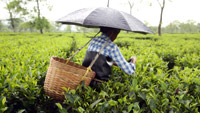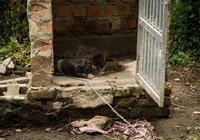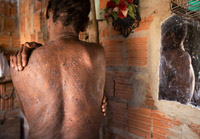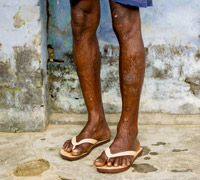
The research from the UK headquartered global anti-poverty group, including in-depth interviews with workers in India and Brazil and a survey of workers in five other countries, highlights how the supermarkets’ relentless drive to cut costs and maximise profits is fuelling poverty, abuse and gender discrimination in their supply chains.
The interviews with workers on 50 tea plantations in Assam revealed that cholera and typhoid are prevalent because workers lack access to toilets and safe drinking water. Women workers, who are often in the lowest paid most labour-intensive jobs, regularly clocked up 13 hours of back breaking work a day.
Responding to the October 2019 report, Aldi, Morrisons, Tesco and Sainsbury’s confirmed that they source their own brand tea from companies whose suppliers include the estates visited and Lidl was amongst other global supermarkets who source tea from the Assam region. Walmart, who own Asda, responded and neither denied nor confirmed links.
On fruit farms in North East Brazil, workers reported developing allergies and serious skin diseases as a result of using pesticides and other chemicals without adequate protection on grape, melon and mango farms that supply supermarkets including Lidl and Sainsbury’s and previously Tesco and Morrisons. Walmart again neither denied nor confirmed links.
Rachel Wilshaw, Oxfam’s ethical trade manager, said: “Despite some pockets of good practice, supermarkets’ relentless pursuit of profits continues to fuel poverty and human rights abuses in their supply chains. Supermarkets must do more to end exploitation, pay all their workers a living wage, ensure women get a fair deal and be more transparent about where they source their products.”
She added: “Supermarkets are snapping up the lion’s share of the price we pay at the till but the workers who toil for hours to harvest tea and fruit face inhumane working conditions and are paid so little they can’t even feed their families.”
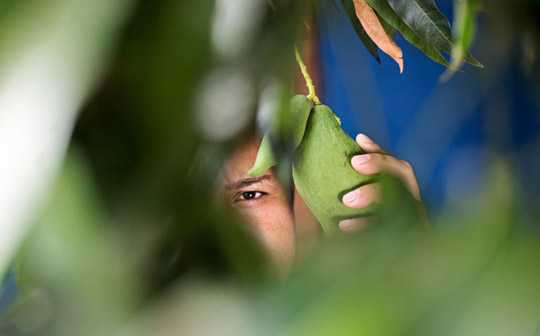 |
CONTROLLED CONDITIONS This 28-year-old woman has been a seasonal worker in the packing house of a mango and grape company in Rio Grande do Norte, Brazil. She cleans the calcium oxide coating off mangoes, applied to protect the fruit from the sun's rays. The company provides t-shirts and boots, but no gloves or other protective equipment. The work is intensive and stressful; conversation between employees and even the use of the toilet is controlled.
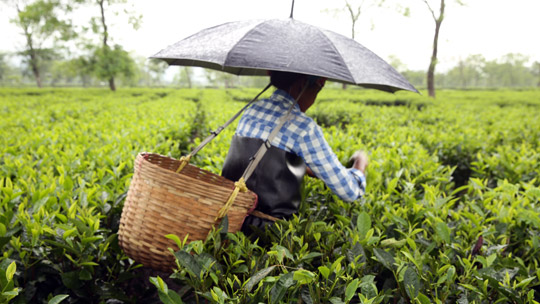 |
TEA SHIRT This woman in an Indian tea plantation wears her husband’s shirt over her sari to prevent it from being soiled. The plastic wrapped round her body substitutes for the tarpaulin sheet the employer is supposed to provide to protect workers from the tough, sharp tea bushes. In most plantations, tarpaulin sheets are given only once every two years, but don’t survive the tough conditions for long. She works under intense pressure to meet a target of 24 kilograms per day, however bad the conditions.
 |
PIG STY A piglet rests inside a broken toilet intended for use by tea workers in an Assam plantation. The toilet, in a housing block for the tea pickers, has been broken and dilapidated for years. Few plantations provide toilets and those that are available are frequently unusable because of lack of proper water supply. The poor conditions mean cholera and typhoid are endemic on the plantations.
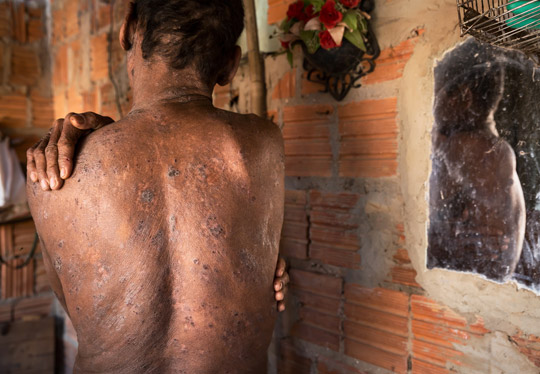 |
OPEN SORE This Brazilian tractor driver, 58, worked at a grape and mango company in Brazil’s São Francisco Valley. He recently developed itching, exposed wounds and marks all over his body. Under the sun, he reports that his eyes start to burn, and his wounds to itch. Although it is accepted the pesticides and fertilisers he applies are to blame, the case is not recorded as an ‘occupational disease’.
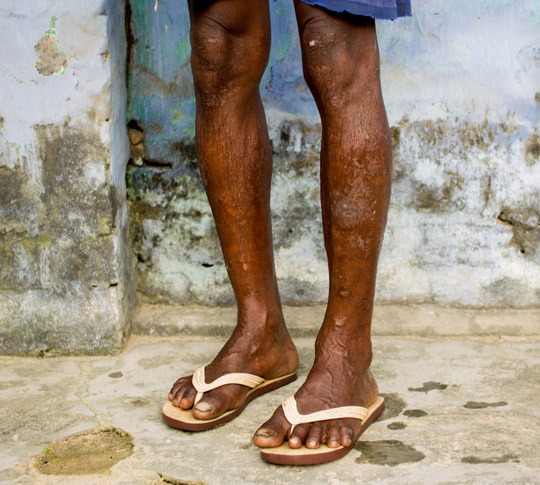 |
PROTECTION DENIED This tea worker’s legs were burnt by the powerful pesticides he sprayed in the plantation. Similar rashes and discolouration are present on his arms, back and neck. While there are protective suits, shoes and gear in the warehouses, they are only brought out while the plantation is being inspected by external agencies. The rest of the time the protective gear is locked away. He had to obtain his own medication for the condition from a private pharmacist.
 |
OLD PROBLEM This retired woman, whose age is estimated to be between 70- and 80-years-old, was born in the tea gardens. Her sons and daughters work in the garden now, while she stays home. Despite having a sum deducted from her wages and put into a provident fund throughout her working life, she is still awaiting her lump sum pension payout.
| Oxfam resources | |
| • | Oxfam’s Behind the Barcodes campaign aims to tackle poverty, suffering and inequality in the food sector. It targets international supermarket groups and their supply chains. |
| • | Addressing the human cost of Assam tea. |
| • | Sweet and Sour: An investigation of conditions on tropical fruit farms in North-East Brazil. |
| • | Workers’ rights in Supermarket Supply Chains. |
| • | Worker survey in the Philippines, Ecuador, Costa Rica, Peru and the US. |
Discount chains
Workers on the farms and plantations that supply tea or fruit to global supermarkets including Lidl, Aldi, Sainsbury’s, Tesco and Morrisons are facing poverty and harsh working conditions, according to new research from Oxfam.
Images
Click on images for larger versions


